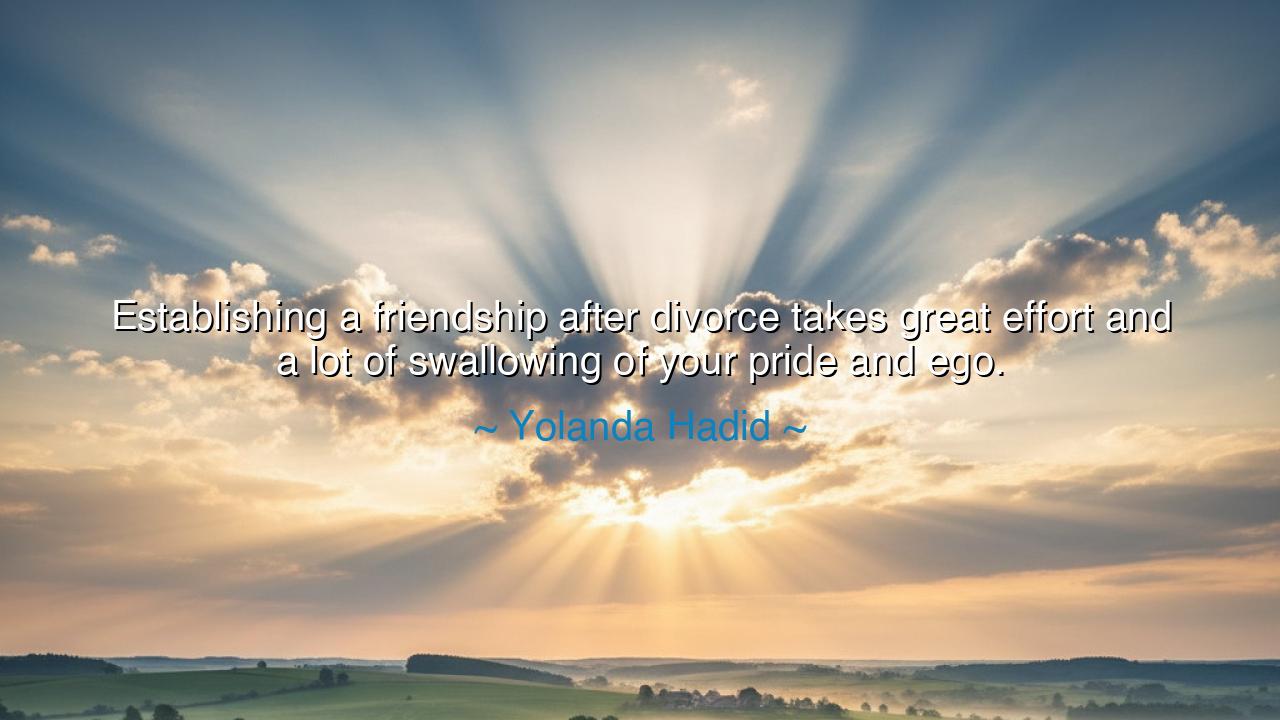
Establishing a friendship after divorce takes great effort and a
Establishing a friendship after divorce takes great effort and a lot of swallowing of your pride and ego.






In the labyrinth of human relationships, there are few trials as poignant and transformative as the divorce. The end of a marriage is often seen as the severing of an emotional bond, a ripping apart of the shared fabric of life. Yet, in the aftermath, the wisdom of the ancients tells us that the true test of a relationship lies not in its beginning or even its end, but in what follows. Yolanda Hadid, reflecting on her own journey, speaks of the profound challenge in her words: "Establishing a friendship after divorce takes great effort and a lot of swallowing of your pride and ego." These words resonate deeply, for they call upon a truth that has echoed across the ages—that true healing comes not from defeat, but from the humility and wisdom that emerge from it.
In ancient times, relationships were not seen as static or easily discarded. The Greeks and Romans understood that to endure the ebb and flow of love, pride, and ego was to truly understand the nature of the human soul. Take, for example, the tragic tale of Penelope and Odysseus. Their bond was tested for years, through separation, uncertainty, and even the temptation of others. But despite the physical distance, Penelope remained loyal, holding space for Odysseus even as he wrestled with his own ego and pride in his journeys. The love between them was not easily broken, for they had to learn to forgive, to swallow their pride, and rebuild a relationship from the fragments of what they once had.
The wisdom of the ancients tells us that pride and ego are not just obstacles in romantic relationships—they are barriers to authentic connection itself. Socrates, in his dialogues, emphasized the need to rid oneself of the illusion of self-importance in order to engage in true wisdom. Divorce may seem like the ultimate defeat, but it is, in many ways, the opportunity to learn and grow from the emotional wreckage. As Hadid so rightly points out, rebuilding a friendship after a divorce requires a level of humility, an acknowledgment that both parties must lay down their pride in order to move forward. In this way, the end of a marriage can become the beginning of a different, more honest relationship—one that is not driven by past grievances but by a shared desire for mutual respect.
Consider the example of Abraham Lincoln and Mary Todd Lincoln, whose marriage was fraught with challenges and personal struggles. While they faced immense political pressures and personal tragedies, they continued to support one another in public life. Despite their profound personal differences, Abraham and Mary worked together during the most trying times of their lives. Their ability to swallow pride and continue to support one another, even as their personal relationship was tested, speaks to the possibility of forging something meaningful from hardship. Hadid’s words resonate with this historical example: that the foundation of a true friendship after a relationship’s breakdown lies not in victory or defeat, but in the ability to humble oneself and recognize the humanity in the other.
The key to this transformation is the act of forgiveness—for both others and oneself. Marcus Aurelius, the stoic philosopher, often reflected on the importance of forgiveness as a pathway to peace. He believed that resentment was a poison that prevented individuals from moving forward, and that only through the release of this burden could one find true freedom. In the case of divorce, forgiveness is not simply about letting go of past hurts, but also about releasing the ego that clings to pride and perceived wrongs. Hadid suggests that the real strength in rebuilding a friendship after divorce is the humility required to let go of the old wounds and move forward, not as adversaries, but as co-creators of a new bond.
The lesson here for all of us is clear: in life, as in relationships, the greatest challenge is not in avoiding hardship, but in how we choose to respond to it. Divorce, while painful, can offer a profound opportunity for growth and renewal. It requires the courage to face our own vulnerabilities, the wisdom to let go of ego, and the humility to rebuild, not out of obligation, but out of a genuine desire to nurture a new form of connection. As the ancients knew, the strongest relationships are those that survive not through avoidance of difficulty, but through shared struggle and the willingness to evolve.
So, let us embrace the wisdom of Yolanda Hadid and the ancients, understanding that the journey from conflict to reconciliation is not easy, but it is through the act of swallowing pride and embracing humility that we can build the strongest relationships. Whether in the aftermath of a divorce, a loss, or any personal challenge, let us be willing to let go of the things that keep us from connection, and let us build something new and beautiful—a relationship based on respect, honesty, and a shared commitment to moving forward together. This is the true power of friendship, and it is a gift that can endure through all of life’s trials.






AAdministratorAdministrator
Welcome, honored guests. Please leave a comment, we will respond soon